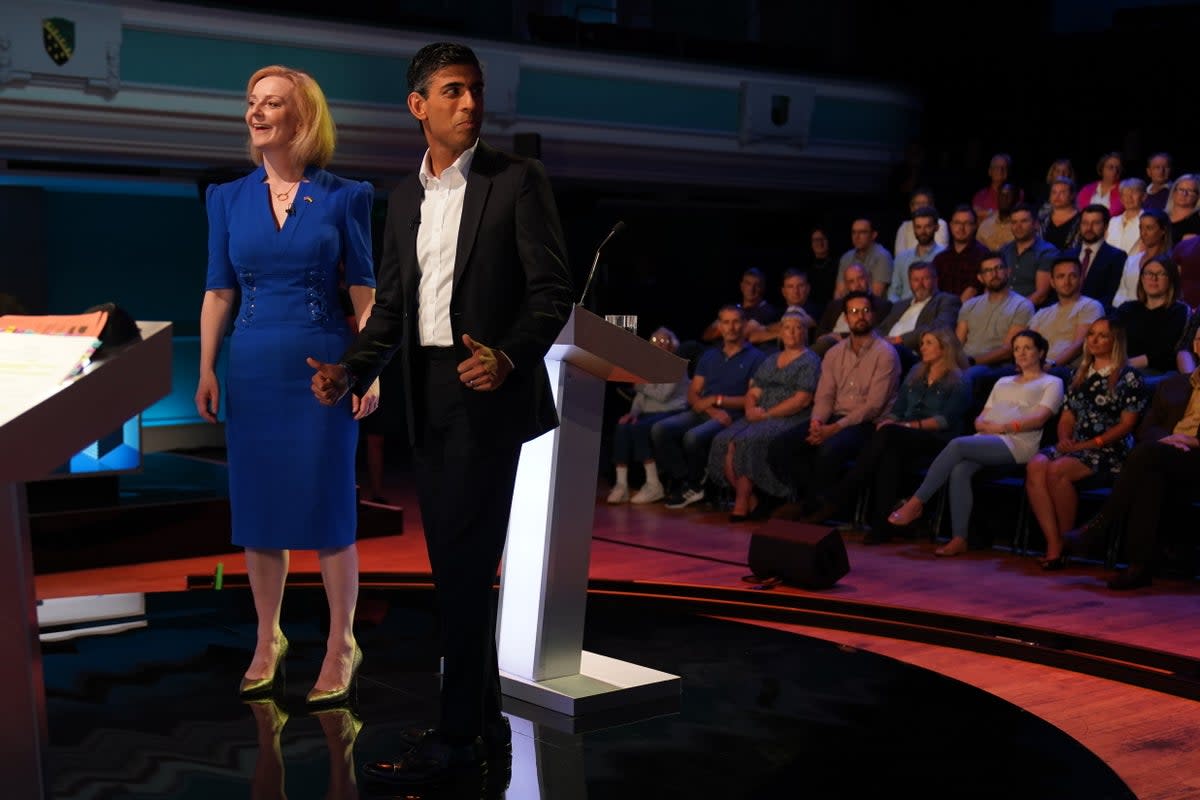Sunak and Truss both promise more scrutiny of Scottish Government

The two Tory leadership contenders have both promised greater scrutiny of the Scottish Government if they become the next prime minister.
Liz Truss, the favourite in the race, committed to get “Scotland’s economy moving”, and vowed to give Members of the Scottish Parliament (MSPs) special legal protection, allowing them to be more outspoken as they scrutinise decisions made by the devolved government.
Rishi Sunak meanwhile promised that Scottish civil servants would face greater scrutiny from Westminster, while UK ministers will be required to be more visible north of the border.
Their pledges came ahead of the candidates heading to Perth to face Tory members at an official hustings on Tuesday.
Ms Truss said: “Having grown up in Paisley, I consider myself to be a child of the Union. When I say I’ll deliver for our country, I mean all of it.
“I will never let anyone talk down Scotland’s potential. As a nation we are stronger together and the UK needs Scotland as much as Scotland needs the UK.
“For too long, people in Scotland have been let down by the SNP focusing on constitutional division instead of their priorities. That won’t happen under my watch.”
She added: “I’ll make sure that my government does everything to ensure elected representatives hold the devolved administration to account for its failure to deliver the quality public services, particularly health and education, that Scottish people deserve.
The future of the United Kingdom is bright but our Union must work together, each nation shoulder to shoulder, to get there
Rishi Sunak
“As prime minister and minister for the Union, I will deliver on my ambitious plan to capitalise on the opportunity we have to turbocharge the growth and business investment required to get Scotland’s economy moving.”
Ms Truss’s campaign has said she would push for a trade deal with India if made prime minister, with the aim of slashing a longstanding 150% tariff on whisky exports.
She would change the Scotland Act to give parliamentary privilege to MSPs, in order to create more “robust questioning” of ministers and increase the powers of the Scottish Parliament to hold the Scottish Government to account.
Mr Sunak meanwhile promised to make it a requirement for Scotland’s most senior civil servant, the permanent secretary to the Scottish Government, to attend Westminster’s Public Affairs and Constitutional Affairs (PACAC) Select Committee each year, just like the UK Government’s cabinet secretary.
The former chancellor has also promised to enforce “consistent reporting of public service performance data across the country” so that UK Government could hold Scottish Government accountable for essential public service delivery.
Mr Sunak said: “The future of the United Kingdom is bright but our Union must work together, each nation shoulder to shoulder, to get there. We must defeat the collective challenges threatening the health of our public services. Under my plans the UK Government will play its part, but the same must be reciprocated by Holyrood.
“For too long the SNP has been able to obscure its failures by picking and choosing the data it publishes – I would change that, ensuring the Scottish Government’s record could be held to account, while ensuring our public services are better joined up.
“Scottish senior civil servants will also face greater scrutiny, with the permanent secretary to the Scottish Government required to appear annually at a UK Parliament Select Committee hearing.”
On Saturday, Ms Truss accused devolved leaders in Scotland, Wales and Northern Ireland of playing “political games” rather than delivering for voters.
Her comments came after she sparked controversy by denouncing Scotland’s First Minister Nicola Sturgeon as an “attention seeker” suggesting she would ignore her demands for a fresh referendum on independence.
Discussing the candidates’ commitments, a Scottish Government spokeswoman said: “The Scottish Parliament, alongside the people of Scotland, rightly holds Scottish ministers accountable, which includes scrutinising the Scottish Government’s yearly programme for government and Scottish budget.
“Scottish ministers have made clear that they will continue to resist any attempts to change the devolution settlement which the people of Scotland voted for in 1999.”

 Yahoo News
Yahoo News 
